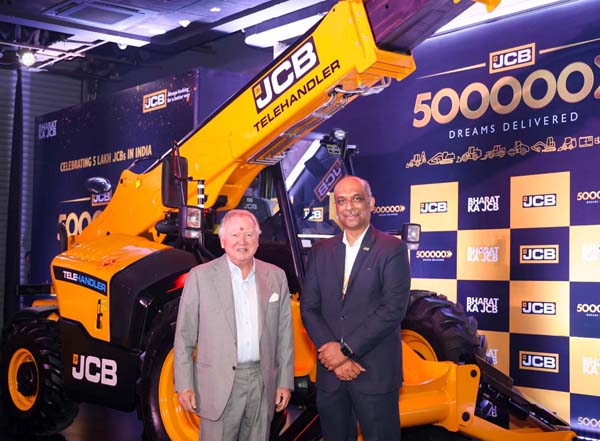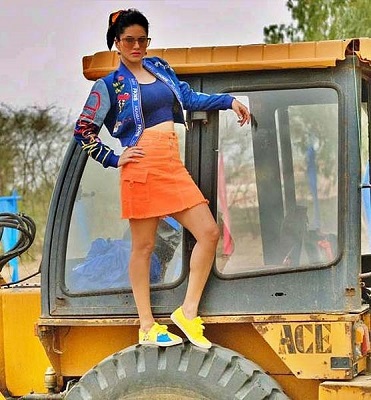
Anand Parthasarathy
In 1960, the Oxford English Dictionary added a new word “JCB”, defined as a ‘proprietary name for excavators and other earthmoving equipment made by the firm of J.C. Bamford ( Excavators) Ltd.
In India which is the UK-based multinational’s largest manufacturing base in the world and where three out of four pieces of construction equipment in use are estimated to come from JCB, the acronym is widely used as a synonym for bulldozer.
This week, the company which has had a presence in the country for 45 years, celebrates the roll out of its 500,000th construction equipment – a category that spans usage in civil construction, highways, material handling, mining & quarry and agriculture.
All its machinery is proudly claimed to be ‘Made in India’ – at one of six Indian manufacturing plants – and many have their designs honed at JCB’s India Design Centre in Pune, Maharashtra, the company’s largest R&D operation outside the UK.
The 500,000th machine, is a Telehandler, a versatile machine for material handling at heights in a safer manner as compared to traditional options. Telehandlers are manufactured in JCB’s Jaipur plant since 2014, in an eco-friendly, ‘green’ plant, where 34% of the workforce on the shop floor comprise of women.
Its India headquarters at Ballabgarh in Haryana, close to the national capital Delhi, is also the world’s largest manufacturing facility for the Backhoe Loader, a construction vehicle that consists of a tractor-like unit fitted with a loader-style shovel/bucket on the front and an agriculture-type backhoe on the back. A factory in Pune manufactures Tracked Excavators, Wheeled Loaders and Compaction equipment. JCB’s sixth factory in Vadodara, spread on a 44-acre campus was inaugurated in April 2022.
Lord Bamford (Antony Paul Bamford), JCB’s Group Chairman and the son of the founder Joseph Cyril Bamford ( whose initials make the name of the company), said this week, while attending ceremonies at Ballabgarh: “India is today one of the strongest economies in the world. There has been a significant focus on infrastructure development over the past decade and we are proud to have been a part of this growth through our machines”
He added, “We have continued to invest in India since 1979, that was when we set up our first factory here at Ballabgarh. India now plays an important part in our global business, as it is one of our largest markets, and also contributes to the global supply chain for JCB.”
Deepak Shetty, CEO and Managing Director, JCB India said, “It is only fitting that the 500,000th machine to roll out from JCB is Telehandler. This machine, ever since it was introduced in India, has made work sites safer and more productive with its superior design and engineering. JCB is a world leader in Telehandlers and as India grows, we see opportunities for this machine in the material handling sector. Additionally, our brilliant machines such as Backhoe Loaders, Excavators among others will continue to be used in the infrastructure sector.”
Exports to 130 countries
JCB has a network of more than 60 dealers and 700 outlets spread throughout India, employing 8000 professionals and supported by five warehouses. The network also extends to the South Asia region of Nepal, Bhutan, Bangladesh, Myanmar, and Sri Lanka, where JCB businesses are managed by the Indian Operations. Beyond the region, JCB exports its India-made equipment to 130 countries.
The parent company has innovated over the years and in 2022 developed the construction industry's first ever 20-tonne excavator powered by a hydrogen fuel cell. A Loadall telescopic handler, which is used in the construction industry and on farms around the world has also been powered by hydrogen.
However JCB’s India operation remains its Crown Jewel and its operations in this country are estimated to contribute around 20% of its annual global revenue. For many in India’s farming and construction sector the name JCB is used generically for earthmoving equipment, just as in another day, a ‘Nokia’ meant a mobile phone for many millions of users.
Viral meme on JCB

“JCB Ki Khudayi” ( JCB digs) became a a viral meme on social media in India around 2019 -- when Bollywood actress Sunny Leone posted a photo of herself atop a JCB excavator on Twitter ( now X) and Instagram.
Around the same time, there were multiple videos on YouTube of bridegrooms (and their guests) in North India, arriving for the wedding, on a JCB tractor. One intrepid groom in Himachal Pradesh, cut off from the wedding venue by heavy snowfall, solved his transportation problem on his JCB. The bride took the wheel on the journey home. See India Today YouTube video here.
But such creative use -- and instant recognition in India of JCB’s distinctive yellow colours and white-on-black logo-- has its downside. In recent years, JCB machines have been deployed – and widely picturised on television news programmes -- as some state governments with a rather cavalier approach to legal niceties, have used these machines to summarily bulldoze dwellings of so-called land encroachers, without waiting for due process. Needless to say, JCB can’t be held responsible for what use its customer assign to their machines, but the optics in such cases may been something the company could do without.
This has appeared in an edited version in NewIndiaAbroad